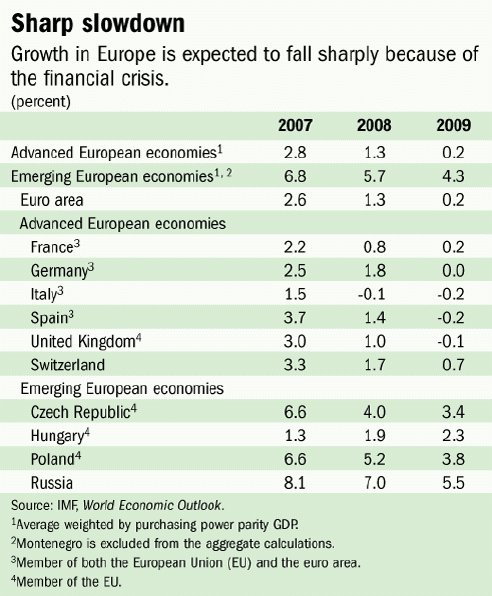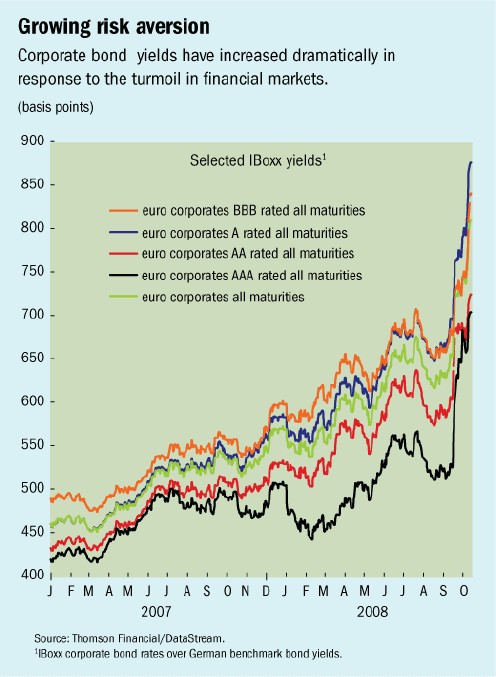
Typical street scene in Santa Ana, El Salvador. (Photo: iStock)
IMF Survey: Financial Crisis Takes Harsh Toll on Europe
October 21, 2008
- Growth in Europe to fall sharply, before starting to recover in late 2009
- Easing inflation allows policies to focus on cushioning the downturn
- Coordinated crisis management measures should help stabilize financial system
A confluence of adverse shocks has depressed economic activity in Europe and a gradual recovery is not expected until late next year, the IMF says in its latest regional outlook for Europe.

Textiles in Augsburg, Germany: Domestic demand is weakening across Europe in continent's worst financial crisis since 1930s (photo: Newscom)
REGIONAL ECONOMIC OUTLOOK
The outlook, titled "Europe: Dealing with Shocks," says that Europe is facing its worst financial crisis in decades. Credit growth is slowing and domestic demand is weakening across the continent. At the same time, past commodity price increases have boosted headline inflation, depressing consumption.
In advanced Europe, a mild recession is expected in the near term. Real GDP growth is projected to drop to 1.3 percent in 2008 and 0.2 percent in 2009 (down from 2.8 percent in 2007). Growth is weakening in the emerging economies as well (see table). However, the decisive measures taken by a number of European governments should help contain the crisis and output growth is expected to start recovering in the second half of 2009.

Financial crisis deepens
The turmoil in financial markets has reached crisis proportions in recent weeks. Several large financial institutions in the United States and Europe failed and had to be nationalized. Borrowing costs and credit default spreads in Europe have reached historically high levels, and the functioning of credit markets has been severely impaired.
Financial stock prices have fallen substantially, reflecting a spike in risk aversion by investors. Corporate bond yields are at their highest levels in 10 years (see chart). Growth of credit to businesses and households—and especially mortgage credit—has slowed significantly.
The emerging economies, which until recently seemed immune to the financial crisis, are now under serious pressure as well. In a vicious circle, the economic slowdown in Europe may contribute to a broader deterioration of loan quality, especially in regions with falling housing prices.

Call for coordinated actions
Restoring financial stability in Europe is the main policy priority [read related story], and requires a comprehensive and coherent global approach. European policymakers have recognized that coordination of crisis management measures is essential. Several central banks announced a coordinated interest rate cut in October and expanded liquidity provision.
European leaders also agreed on the principles of crisis management and followed up with a number of measures aimed at stabilizing markets, including extended deposit insurance, bank recapitalization programs, and debt guarantees. While the various measures retain some country-specific flavor, they represent an important move toward a new coherence in European policy efforts.
"Times are no doubt extraordinarily uncertain, but we are now seeing the concerted response that demonstrates policymakers' awareness that the global crisis needs a global response. For Europe, this crisis provides a catalyst for improved cross-border coordination, and we encourage European leaders to follow up with bold steps on their recent commitment to concerted and coordinated action, to resolve this crisis swiftly," said Alessandro Leipold, Acting Director of the IMF's European Department, at a press briefing in Brussels on October 21.
Beyond immediate crisis management, Europe will need to rethink its financial stability arrangements. This will require action on a range of fronts, including stepping up joint financial oversight, introducing mechanisms to strengthen market discipline, and improving the cross-border crisis resolution frameworks.
Inflation receding
The surge in commodity prices has boosted headline inflation and depressed consumption across Europe earlier this year. The IMF's analysis suggests that deteriorating economic conditions, improved labor market flexibility, and stronger monetary policy credibility have helped limit second-round effects from the commodity price surge in the advanced European economies.
In contrast to the 1970s, the increase in energy prices since 2003 have not had a significant impact on core inflation in these economies. However, the risk of spillovers of commodity price pressures to a broad range of consumption goods still remains in some emerging economies, for which food and fuel account for a substantial share of consumption.
More recently, as the global economy slows, commodity prices have moderated and headline inflation is receding. This has freed room for macroeconomic policies to focus on supporting growth. In the advanced economies, headline inflation is projected to drop to levels below central bank objectives over the policy horizon, allowing a move to a more accommodative policy stance. However, in select emerging economies, where commodity price shocks have come on top of existing price pressures from overheating, or large external vulnerabilities persist, a continuing tight policy stance may be justified.
"With upside risks to inflation rapidly dissipating, the recent concerted easing of monetary policy was appropriate and there is scope for further easing going forward. Meanwhile, the provisions of the Stability and Growth Pact—which incorporate greater flexibility than is often thought—will allow fiscal policy to cushion the downturn," Leipold said.
Comments on this article should be sent to imfsurvey@imf.org


